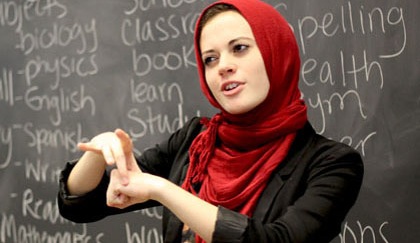“What do you think of war?” I remember looking into my cup of coffee as a stranger asked me that question back in 2007. He smiled at me kindly, almost contritely, but I wasn’t sure if he was apologizing for the randomness of the topic, or for the war itself. I had encountered both in the past. All he knew about me was that I identified as an Iraqi-American.
I had volunteered my dual nationality on the first round of questioning–no prodding was necessary with this expatriate. I was a refugee, not a second generation American who would capitulate after the standard follow-up question of “No… but where are you really from?”
Given my identity, it was not surprising that as I waited on my crepes to finish cooking, this stranger in a French bistro wanted to know how I felt about a war taking place thousands of miles away. He wanted to know how I felt about death, suffering and the future of Iraq. He wanted me to explain war in a way that was palatable. I knew this from every other discussion I had had on war; no one was interested in hearing me pause, discuss theoretical frameworks from an ivory towers, or offer historical context that predated lies about weapons of mass destruction. This man simply expected me to pick sides like a cable T.V. pundit. Even before the Twitter revolution had reshaped political dialogue, there was a thirst for perfectly packaged rhetoric that was easily related to an audience who then either tore it apart or happily digested it.

(Photo source: telegraph.co.uk)
As I sat in the busy cafe, I knew this stranger had already formed an opinion and was looking for either validation or staunch opposition. I obliged him, because my French pancakes were not yet done. Perhaps I also decided to engage because I was young, obsessed with the excitement of political rhetoric, and enthusiastic about my belief in predictive game theoretic models (Alas De Mesquita, how you tease). All in all, I thought I had it figured out-ish. Most importantly however, I responded to this man because we were both privileged enough to exchange articles and quotes, utterly oblivious to the bloody nuance of it all.
That was years ago; I was a different girl altogether. I visited Iraq several times since then, each visit overwhelming me with perspective. My Kurdish/Arab/Sunni/Shia background allowed me to listen to a spectrum of conversations and explore rich histories and deep socio-political convictions. Variables I had never thought of, like the vibrant grassroots activism within Iraq, suddenly became incredibly relevant to new equations. I still found myself transforming back into a political junkie at times, only withdrawing from the rhetoric when something triggered a reminder within me of the suffering of those I had held, loved, and spoken to as a traveler.
I never pulled back for too long, especially as the issue of Iraq began to fade into the background, replaced by sexier political conversations about Arab springs and Russian winters. I enjoyed the freedom from the pressure of the early years of the Iraq war when everyone had an opinion and everyone wanted to know yours. In the backdrop of it all, so many had already fleshed out their absolute, unwavering truths about an issue so complex that it evolved daily. I never really minded that opinions were entrenched. I was just happy to be allowed to read, to write, and to reflect in relative peace.
Then it happened—the very thing I had dreaded. The “Iraq issue” morphed from a dormant volcano into fiery relevance once more. A Google alert from Reuter warning that Mosul had been seized by ISIS militants gave me a few days to brace myself before the inevitable headlines.
The Sunnis and Shias have always hated each other, we should have never gotten involved
“They” don’t want peace or freedom, you can’t force it on “a population”
At least Saddam was stable
Obama should avoid reengaging in Iraq
Why are we sleeping on the issue?
This is the result of America’s support of the Syrian uprising
This is a product of Iranian involvement
Where is the Kurdish government in all this?
The talking points emerged from the ashes with renewed strength. Along with them came newly crowned Middle East experts, many of whom built their careers as analysts of the Iraq issue. I reflected on the conclusions of these experts which often come loaded with defeatism, political loyalties, or misinformation. It is the type of superficial–and even flat out inaccurate–analysis that my Palestinian friends and veteran activists have spent decades trying to address through reasoned debate, and seasoned resolve.
We are faced with the inherent cruelty of ISIS–a disenfranchised terrorist organization literally butchering men, women, and children and burning mosques in their path. Would it make you feel better to hear a newly minted expert reduce this to being product of imperialism, and explain how the people of Iraq will never be more than victims stripped of agency and political efficacy?
Years later, as I navigate the world with adult caution, I have come to realize that nothing has truly changed in how we negotiate complex political equations. I am still in that same bistro, staring into the same cup of coffee as a stranger asks me about something inherently embedded in my identity, expecting immediate engagement. I usually comply out of the same sense of obligation. Some days it will be a halfhearted attempt to correct, or a tired nod in agreement of acknowledged mistakes. It is a shadow of my previous self-indulgence.
These days are different. I am different. Although my privilege is still intact, I cannot bring myself to ignore the bloody nuances of it all.
The author is an Iraqi-American with a Masters degree in Political Science. She lives in New York city where she works for a nonprofit and spends her free time posing as a Brooklynite- check out her blog @ http://vivalakhabatha.wordpress.com/
(Photo credit: http://www.krmagazine.com)




